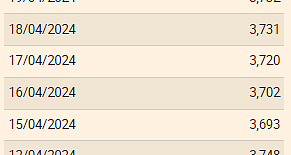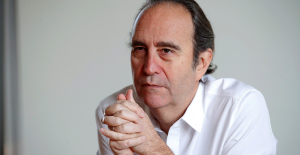Politicians from the CSU like to present Bavaria as a role model for the rest of the republic. But not in this case. Rather, the party is up in arms against the fact that the traffic light factions in the Bundestag want to extend a special feature of the Bavarian state electoral law to the entire republic.
"Up to the last second" action will be taken against the plan by the SPD, Greens and FDP to reform the Bundestag electoral law, said Bavaria's Prime Minister Markus Söder (CSU) and announced a lawsuit in Karlsruhe.
Söder is outraged because that Bavarian peculiarity could mean that the CSU would no longer be represented in the Bundestag if used in the federal government. Because the special feature of the Free State is that there is no basic mandate clause. This means that in Bavaria, winning the first vote by a candidate in a constituency does not necessarily mean that he gets a seat in the state parliament.
Rather, he only gets it if his party creates the five percent hurdle for second votes across Bavaria. If it falls short, it is not represented in the state parliament, even if candidates from this party win first votes in constituencies.
The CSU doesn't care in Bavaria. Because there she should jump the five percent hurdle until the end of all days and thus bring her first vote winner into the state parliament. It is very different for them in a federal election. Since she only has a weak nationwide second vote result in Bavaria because of her candidacy. It was just 5.2 percent in 2021.
If the CSU were to slide even lower in the next federal election and miss the nationwide five percent hurdle, it could - if the basic mandate clause were dropped in the federal government, as in Bavaria - not bring any of its 45 direct mandate winners into the Bundestag. And stay out. No wonder that CSU regional group leader Alexander Dobrindt described Ampel's planned deletion of the basic mandate clause as "simply disrespectful and unfair".
In any case, it comes as a surprise. Because at the beginning of January, in the first draft of an electoral law reform to reduce the Bundestag, which had swelled to 739 MPs, the SPD, Greens and FDP had not yet planned anything like this. They only wanted to set the number of 598 deputies as the standard size of the Bundestag, abolish the system of overhang and compensation mandates as the main driver of inflation and limit the number of direct mandates.
The latter in such a way that a party that wins the first vote should only get as many mandates as the party's second vote result in the state. If a party has more constituency winners, it should decide which of them has the best first vote result in the internal party ranking.
The traffic light coalition is expected to adopt the controversial electoral law reform on Friday in the Bundestag with its own majority. This was announced by the parliamentary group leaders Rolf Mützenich (SPD), Britta Haßelmann (Greens) and Christian Dürr (FDP) in Berlin.
Source: WORLD
That would have cost the CSU, with its disproportionately large number of first vote winners, a few direct mandates. But by no means all. And now in the second traffic light draft, it is being spared even more, because the standard size of the Bundestag should be 630 MPs, so that some direct mandate winners from the CSU could draw in more.
But at the same time, the traffic light groups now want to introduce the significant tightening that there may only be direct mandate holders if their party jumps the five percent hurdle nationwide. This idea came about in the debates between the experts and the parliamentary groups, including the CDU, about the first draft.
It turned out that anyone who makes the number of direct mandates even remotely dependent on the result of the second vote and also abolishes the overhang and compensation mandates makes the second vote for the parties dominant over the first vote for the people. But if the second vote is dominant, then one of its basic rules, the five percent hurdle, must also be dominant. It would be legally contradictory to uphold them on the one hand and allow a party to subvert them with direct mandates on the other.
The Dusseldorf party lawyer Sophie Schönberger therefore considers the omission of the basic mandate clause to be “stringent”. "It fits in with the logic of the reform, which is making the transition to proportional representation based on the proportion of second votes," said Schönberger WELT.
In such a transition, the first vote will in future only serve to “balance the candidate places on the state lists of the parties through a specific choice of people in the constituencies”. The second voice is dominant. "But if," Schönberger continues, "with this transition to proportional representation, the proportion of votes according to the second vote is decisive, it cannot be that these proportions of second votes are then canceled out again by direct mandates."
Schönberger considers it very unlikely that a lawsuit against this could be successful in Karlsruhe. "Although the Federal Constitutional Court has declared it possible in principle for direct mandates to play a more important role, the court has not declared this to be absolutely necessary. I therefore see no problem in going the other possible route and considering the second vote as the main vote, which alone decides on the number of MPs with which a party is represented in the Bundestag.
The Heidelberg constitutional lawyer Bernd Grzeszick sees this much more critically. He also certifies that the traffic light plans strengthen the second vote compared to the first vote, but considers this to be wrong and evaluates the draft amendment as the exacerbation of a tendency that was missed from the start. "The complete elimination of the basic mandate clause shows the problems of the reform approach," said Grzeszick WELT.
He refers to the debates about the first draft. “In the hearing of the Interior Committee, several experts pointed out that the devaluation of the elections in the constituencies driven by the traffic lights also puts the justification of the basic mandate clause in the previous version under pressure. The now proposed complete deletion of the basic mandate clause is further evidence that the path taken by the traffic lights is leading in the wrong direction.”
The impact of the traffic light approach is most evident in the Left Party. If the reform had applied in 2021, she would not be in the Bundestag. Because at that time she remained below the five percent hurdle with 4.9 percent of the second votes. But because of first-vote victories in three constituencies, the left came into the Bundestag anyway. And not just with the three constituency winners. But because of the broad basic mandate clause in the Bundestag electoral law with 39 MPs, which corresponded to the 4.9 percent of the second votes.
The traffic light plan is therefore rejected by the Left MP and Bundestag Vice President Petra Pau: "The current proposal by the coalition for electoral law reform amounts to an absolute devaluation of the first votes, which I am absolutely skeptical about," said Pau. The question arises as to how representative the Bundestag elections would then still be.
"The inclusion of all people in Germany who are able to vote is an important prerequisite for a healthy democracy," said Pau, turning his attention to other electoral law issues: "The coalition did not make the voting age over 16 nor the voting rights of foreign nationals who have been living in Germany for years taken into account."
On Friday, the Bundestag is to vote on the reform plans of the traffic light groups. Then the majority of the coalition factions is sufficient, and that can be considered safe: in votes in the factions on Tuesday afternoon, the deputies of the Greens and FDP agreed unanimously and those of the SPD with an overwhelming majority.
This was announced by the parliamentary group leaders Rolf Mützenich (SPD), Britta Haßelmann (Greens) and Christian Dürr (FDP). They described the reform as "fair and constitutional". They also appealed to the Union to agree to the reform after all.
"Kick-off" is WELT's daily news podcast. The most important topic analyzed by WELT editors and the dates of the day. Subscribe to the podcast on Spotify, Apple Podcasts, Amazon Music, Google Podcasts, among others, or directly via RSS feed.

 The Euribor today remains at 3.734%
The Euribor today remains at 3.734% Germany: the trial of an AfD leader, accused of chanting a Nazi slogan, resumes this Tuesday
Germany: the trial of an AfD leader, accused of chanting a Nazi slogan, resumes this Tuesday New York: at Columbia University, the anti-Semitic drift of pro-Palestinian demonstrations
New York: at Columbia University, the anti-Semitic drift of pro-Palestinian demonstrations What is Akila, the mission in which the Charles de Gaulle is participating under NATO command?
What is Akila, the mission in which the Charles de Gaulle is participating under NATO command? What High Blood Pressure Does to Your Body (And Why It Should Be Treated)
What High Blood Pressure Does to Your Body (And Why It Should Be Treated) Vaccination in France has progressed in 2023, rejoices Public Health France
Vaccination in France has progressed in 2023, rejoices Public Health France Food additives suspected of promoting cardiovascular diseases
Food additives suspected of promoting cardiovascular diseases “Even morphine doesn’t work”: Léane, 17, victim of the adverse effects of an antibiotic
“Even morphine doesn’t work”: Léane, 17, victim of the adverse effects of an antibiotic MEPs validate reform of EU budgetary rules
MEPs validate reform of EU budgetary rules “Public Transport Paris 2024”, the application for Olympic Games spectators, is available
“Public Transport Paris 2024”, the application for Olympic Games spectators, is available Spotify goes green in the first quarter and sees its number of paying subscribers increase
Spotify goes green in the first quarter and sees its number of paying subscribers increase Xavier Niel finalizes the sale of his shares in the Le Monde group to an independent fund
Xavier Niel finalizes the sale of his shares in the Le Monde group to an independent fund Owner of Blondie and Shakira catalogs in favor of $1.5 billion offer
Owner of Blondie and Shakira catalogs in favor of $1.5 billion offer Cher et Ozzy Osbourne rejoignent le Rock and Roll Hall of Fame
Cher et Ozzy Osbourne rejoignent le Rock and Roll Hall of Fame Three months before the Olympic Games, festivals and concert halls fear paying the price
Three months before the Olympic Games, festivals and concert halls fear paying the price With Brigitte Macron, Aya Nakamura sows new clues about her participation in the Olympics
With Brigitte Macron, Aya Nakamura sows new clues about her participation in the Olympics Skoda Kodiaq 2024: a 'beast' plug-in hybrid SUV
Skoda Kodiaq 2024: a 'beast' plug-in hybrid SUV Tesla launches a new Model Y with 600 km of autonomy at a "more accessible price"
Tesla launches a new Model Y with 600 km of autonomy at a "more accessible price" The 10 best-selling cars in March 2024 in Spain: sales fall due to Easter
The 10 best-selling cars in March 2024 in Spain: sales fall due to Easter A private jet company buys more than 100 flying cars
A private jet company buys more than 100 flying cars This is how housing prices have changed in Spain in the last decade
This is how housing prices have changed in Spain in the last decade The home mortgage firm drops 10% in January and interest soars to 3.46%
The home mortgage firm drops 10% in January and interest soars to 3.46% The jewel of the Rocío de Nagüeles urbanization: a dream villa in Marbella
The jewel of the Rocío de Nagüeles urbanization: a dream villa in Marbella Rental prices grow by 7.3% in February: where does it go up and where does it go down?
Rental prices grow by 7.3% in February: where does it go up and where does it go down? Europeans: “All those who claim that we don’t need Europe are liars”, criticizes Bayrou
Europeans: “All those who claim that we don’t need Europe are liars”, criticizes Bayrou With the promise of a “real burst of authority”, Gabriel Attal provokes the ire of the opposition
With the promise of a “real burst of authority”, Gabriel Attal provokes the ire of the opposition Europeans: the schedule of debates to follow between now and June 9
Europeans: the schedule of debates to follow between now and June 9 Europeans: “In France, there is a left and there is a right,” assures Bellamy
Europeans: “In France, there is a left and there is a right,” assures Bellamy These French cities that will boycott the World Cup in Qatar
These French cities that will boycott the World Cup in Qatar Serie A: Bologna surprises AS Rome in the race for the C1
Serie A: Bologna surprises AS Rome in the race for the C1 Serie A: Marcus Thuram king of Italy, end of the debate for the position of number 9 with the Blues?
Serie A: Marcus Thuram king of Italy, end of the debate for the position of number 9 with the Blues? Milan AC-Inter Milan: Thuram and Pavard impeccable, Hernandez helpless… The tops and flops of the derby
Milan AC-Inter Milan: Thuram and Pavard impeccable, Hernandez helpless… The tops and flops of the derby Ligue 2: Auxerre leader, Bordeaux in crisis, play-offs... 5 questions about an exciting end of the season
Ligue 2: Auxerre leader, Bordeaux in crisis, play-offs... 5 questions about an exciting end of the season


















